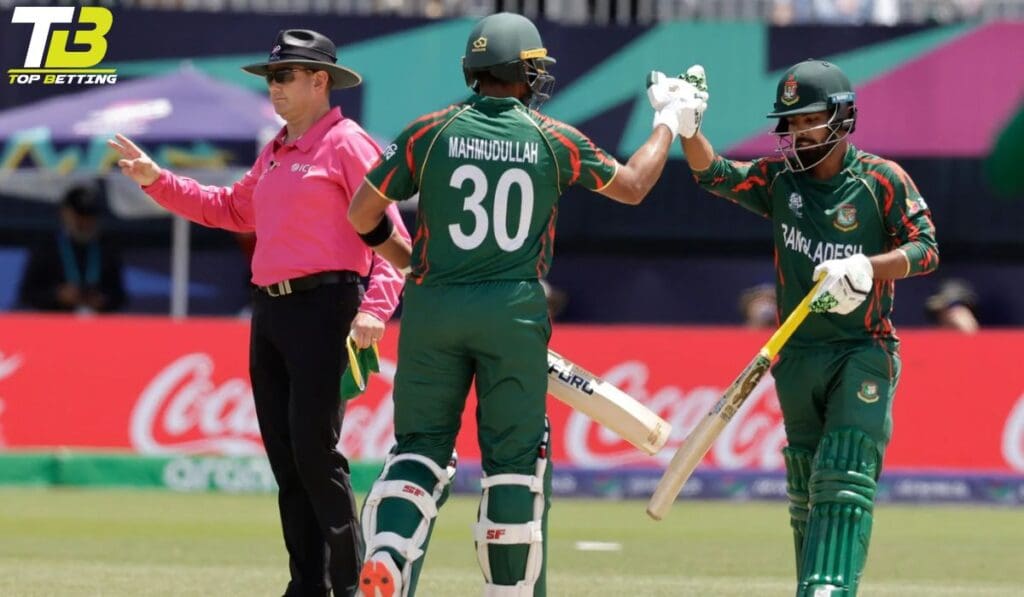
Bangladesh Star Slams ICC Over Umpiring Standards After Loss
The 2024 men’s T20 World Cup in the United States has been marred by a controversial umpiring incident that has drawn the ire of Bangladesh’s young batting sensation, Towhid Hridoy. In a closely contested match against South Africa, a questionable decision by the on-field umpire and the subsequent application of an ICC rule cost Bangladesh dearly, ultimately leading to their narrow four-run defeat.
Performance Overshadowed by Umpiring Woes
Bangladesh, known for their spirited performances on the cricket field, put up a strong showing against the formidable South African team. Chasing a modest target of 114 runs, the Bangladeshi batters were in control of the game for the majority of the innings. However, a critical moment in the 17th over would prove to be a turning point in the match.
The Controversial Incident in the 17th Over
In the 17th over of Bangladesh’s innings, veteran batter Mahmudullah Riyad was trapped in front of the wickets by Ottneil Baartman’s delivery. The on-field umpire, Sam Nogajski, raised his finger to signal Mahmudullah’s dismissal. However, Bangladesh opted for a review, and the third umpire overturned the decision, ruling that the ball had not hit the batter’s pad cleanly.
The ICC Rule That Denied Bangladesh Crucial Runs
While the decision was overturned, a little-known ICC rule came into play. According to the regulations, when the on-field umpire gives a batter out LBW and the decision is subsequently overturned on review, any runs scored off that delivery, including leg-byes, are deemed invalid. As a result, the four leg-byes that had been scored were taken away from Bangladesh’s total, denying them crucial runs at a critical juncture of the match.
Hridoy’s Scathing Criticism of the Umpiring
Towhid Hridoy, Bangladesh’s young batting sensation, did not mince words in his criticism of the umpiring standards during the match. “To be honest, that was not a good call for us in such a tight match,” Hridoy said in the post-match press conference. “In my point of view, the umpire gave that out, but it was pretty hard on us. Those four runs could have changed the match scenario.”
Hridoy’s Perspective on the ICC Rule
Hridoy acknowledged that the ICC rule was not in his control, but he emphasized the significance of those four runs in a low-scoring affair. “The rule, what the ICC has done, is not in my hands, but at that time, those four runs were very important for us,” he said. “I think the umpire has given the call, and the umpire can give a call. They are also human beings, and they could have made a mistake.”
Concerns over Missed Wide Calls and Umpire’s Call Dismissals
Hridoy’s criticism extended beyond the controversial incident in the 17th over. He also pointed out that the umpires had failed to call several deliveries as wides, which could have made a difference in a tight game. Additionally, Hridoy himself was dismissed on an ‘umpire’s call’ decision, further highlighting the need for improved umpiring standards.
Bangladesh’s Missed Opportunity and the Road Ahead
The loss against South Africa was a missed opportunity for Bangladesh, as a win would have all but sealed their qualification for the Super Eights stage of the tournament. Instead, they now find themselves in a precarious position, needing to win their remaining two games to secure a spot in the next round.
Hridoy’s Regret and Determination
Hridoy, who scored a well-crafted 37 off 34 deliveries, expressed his disappointment in not being able to finish the game for his team. “Actually, we were very much confident with that score, and from that position, I should have finished the match,” he said. “It is difficult for a new batter to go and adjust to the conditions. In that position, I should have finished the match.”
The Need for Consistent and Transparent Umpiring
Hridoy’s criticism of the umpiring standards has highlighted the ongoing challenges faced by teams in the T20 World Cup. The incident has reignited the debate around the need for more consistent and transparent umpiring decisions, especially in high-stakes matches where every run can prove crucial.
Implications for the T20 World Cup and Beyond
The controversy surrounding the Bangladesh-South Africa match has the potential to have far-reaching implications for the remainder of the T20 World Cup. It has raised questions about the efficacy of the existing ICC rules and the need for a comprehensive review to ensure fairness and accountability in umpiring decisions.

Conclusion
The umpiring controversy in the Bangladesh-South Africa match has highlighted the importance of addressing the shortcomings in the current system. As the T20 World Cup progresses, cricket governing bodies and tournament organizers must take proactive steps to ensure that umpiring decisions are consistent, transparent, and aligned with the spirit of the game. Only then can the focus truly shift back to the thrilling on-field action that captivates cricket fans around the world.










